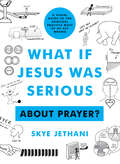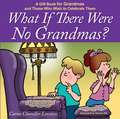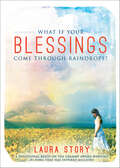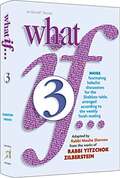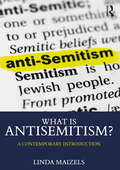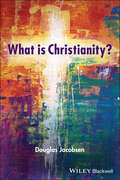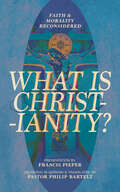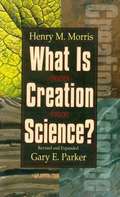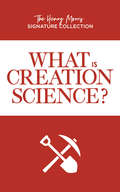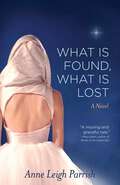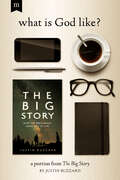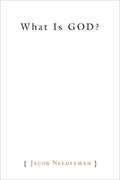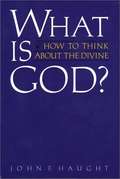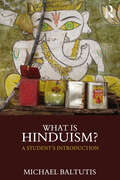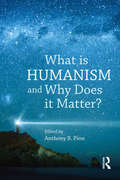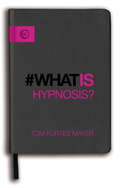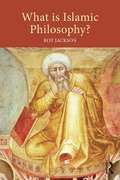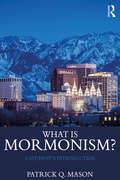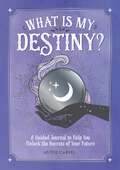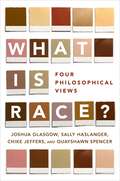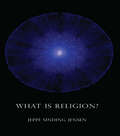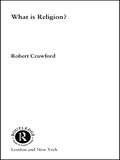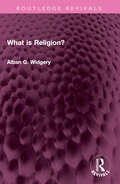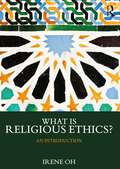- Table View
- List View
What if Jesus Was Serious ... About Prayer?: A Visual Guide to the Spiritual Practice Most of Us Get Wrong
by Skye JethaniGood things come to those who believe . . . right?People like to say, &“Prayer works.&” But what does that mean? Prayer works for what? Getting the answers from God that we want so much? While God certainly cares for your deepest needs, Skye Jethani wants you to know that prayer is so much more than a two-way transaction with a heavenly vending machine. Jesus didn&’t pray like that. And with a pastor&’s heart, Skye wants to take you deeper into what Jesus, the lover of your soul, had to say about talking with God.In What If Jesus Was Serious . . . About Prayer?, you&’ll benefit not only from Skye&’s words of wisdom but his doodles that help the visual learner connect with spiritual truth. Prayer isn&’t about getting answers, but getting God. We need more prayer in our lives—not because God can give us what we crave, but because He offers himself to us in love.
What if There Were No Grandmas?
by Caron Chandler Loveless Dennis HillWhat If There Were No Grandmas? How sad life would be. Grandmas are the glue that holds the world together. Their love, patience, and apple pie are sometimes taken for granted. Now it's time to tell grandmas everywhere how special and loved they are. This fun yet heartwarming book will delight any grandma and let her know how much she is appreciated for all she does. Inside, charming illustrations bring to life the words of an enchanting poem that tells how much Grandma does and how we couldn't get along without her. This is a gift book any grandma will cherish and the perfect way to honor the love, compassion, tenderness, and extra piece of pie grandmas so frequently give out.
What if Your Blessings Come Through Raindrops
by Laura StoryA 30-day devotional based on the bestselling Christian song, Blessings by Laura Story.These 30 daily devotions will guide you into a deeper understanding of God's mysterious use of Blessings. Chapter Titles include, What If Your Blessings Come Through Raindrops? (a signature line in the song), and He Loves Us Too Much To Give Us Lesser Things. Each chapter contains thoughts, prayers and quotes along with a journaling page for you to recall blessings you have seen in your own life.
What if…?: More Fascinating Halachic Discussions for the Shabbos Table, Arranged According to the Weekly Torah Reading (What If…? #3)
by Moshe SherrowWhat if... ...a man needs to take a sleep test, but it will mean missing zeman Kriyas Shema? ...a candy thrown during an aufruf misses the chasan and breaks the gabbai's glasses? ...someone takes out his neighbor's garbage, but there was jewelry in the trash bag? <P><p>Tens of thousands of readers have made the What If? series a staple at their Shabbos table. Based on the popular Hebrew-language series Chashukei Chemed, written by noted rav and posek, Rav Yitzchok Zilberstein shlita, and translated and arranged in the order of the weekly parashah by Rabbi Moshe Sherrow, What If? includes hundreds of real-life halachic questions, each accompanied by a brief, practical scenario to illustrate the case, and an analysis that is understandable and easy to follow. <p><p>What If? 3 continues the stimulating Torah conversation, with more fascinating halachic questions and scenarios. What If... ...your Shabbos table conversation flowed as freely as fine wine? ...your children sat at Shabbos dinner, engaged and enthusiastic by the Torah discussion? ...your guests enjoyed the conversation as much—and even more—as they enjoyed your chulent? What If? 3—The Torah conversation continues!
What is Antisemitism?: A Contemporary Introduction (What is this thing called Religion?)
by Linda MaizelsIn October 2018, a white supremacist murdered eleven Jewish worshipers and wounded six others at the Tree of Life Synagogue in Pittsburgh, Pennsylvania, the deadliest attack on Jews ever perpetrated in the United States. The gunman’s motivation to kill Jews stemmed from his belief that Jews were committing "genocide" against white Americans. Although his animosity was motivated by a racial conception of Jews, the attack took place in a house of worship, illustrating the complex and interlocking web of anti-Jewish hatred based on race, ethnicity, nationality, religion, economic issues, and conspiracy theory that is commonly referred to as "antisemitism." What is Antisemitism? provides a detailed overview of this complex topic. It offers a history of anti-Jewish animosity from antiquity to the present; a discussion of the difficulties of defining antisemitism - arguably one of the most contentious issues in the contemporary discourse on the subject – and three case studies illustrating the diverse and wide-ranging nature of the phenomenon in the present-day, including examples from the political far right, the political hard left, and radical Islamism. With suggestions for further reading, and a chronological structure, this volume is an accessible and essential student textbook.
What is Christianity?
by Douglas JacobsenWhat Is Christianity? provides a fascinating overview of the world’s largest religion, weaving history, theology, spirituality, denominational divisions, and global growth into a single compelling story. Written in clear and captivating prose that requires no previous knowledge of Christianity, it describes the religion inspired by Jesus as a living faith that is still changing and developing today. Reader-friendly chapters introduce the major traditions of Christianity (Eastern Orthodoxy, Roman Catholicism, Protestantism, and Pentecostalism), explaining their spiritual appeal and tracing their evolution over the centuries. Christianity’s recent global expansion is highlighted, but Christianity has been a diverse and multicultural movement from the very beginning. Each chapter provides thought-provoking insights into the beliefs, values, practices, achievements, and failures of Christians as they tried to remain faithful to the message and meaning of Jesus in different times and places. Condenses a vast amount of information into a coherent narrative Explains how and why Christianity has become so incredibly diverse Describes what almost all Christians have always held in common Summarizes the current status of Christianity in each global region Discusses the challenges that Christians worldwide are facing today What Is Christianity? is an ideal introduction to Christianity as a world religion for people who are unfamiliar with Christianity as well as for Christians who want to know more about their own faith and the faith practices of fellow believers from other Christian traditions. An engaging text for general readers, this short volume will also be a stimulating choice for book discussion groups and or for the classroom.
What is Christianity?: Faith & Morality Reconsidered
by Francis Pieper Philip BarteltWe hear from the Apostle Peter that Christians should always be ready to give a confession of the hope that is in them and to defend their faith in an ever-changing world.Originally delivered as an address at a synod convention in 1902, Das Wesen des Christentums or What is Christianity? was written by pastor and professor Francis Pieper.In What is Christianity: Faith and Morality Reconsidered, Pieper takes up Peter's task against those who would confess works, moral improvement, and other man-made projects over and against the confession of Christ and him crucified. He boldly confesses what it means to be a Christian and what Christianity looks like with Christ truly as the center. In so doing, Pieper equips the saints to defend and proclaim the good news of forgiveness of sins on account of Christ alone.Pastor Philip Bartelt (translator of Pieper's presentation) says, "For Pieper, to be Lutheran meant to believe in Jesus Christ as the perfect sacrifice for sins in our stead— that Jesus was put under the law, under our sin, and under our punishment, in our stead and on our behalf, so that by faith we may enjoy perfect freedom, righteousness, and salvation."
What is Creation Science?
by Dr Henry M. Morris Dr Gary ParkerWhat is the better explanation? Many Christians are not aware that a growing number of legitimate scientists now embrace the Genesis explanation of origins. In What is Creation Science, two of the most respected members of that group have given us the benefit of their knowledge: Dr. Henry Morris, who has served on the faculties of five universities, Dr. Gary Parker, a former evolutionary biologist. Their findings throw the brakes on the "evolution train."
What is Creation Science? (The Henry Morris Signature Collection)
by Gary Parker Henry MorrisExplore the truth of science and faith… and what it means to you! Uncover evidences of Creation in living systems Unravel the questions of Creation and the laws of science Understand the vanishing case for evolution science Many Christians are not aware that many legitimate scientists embrace the Genesis explanation of origins. In What is Creation Science?, two of the most respected members of that group have given us the benefit of their knowledge. The book itself, though technical in places, is remarkably clear, and its focus is on a fair dialogue of the issues. So much so that many thousands of readers have taken to heart Dr. Parker's challenge, to "Think About It!" The creation/evolution question is not an issue that concerns only biologists on the one hand and religious people on the other. In one way or another, the issue permeates every field of academic study and every aspect of national life. It deals with two opposing basic worldviews - two philosophies of origins and destinies, of life and meaning. Consequently, it is (or should be) of special concern to everyone.
What is Found, What is Lost: A Novel
by Anne Leigh ParrishFreddie was raised on faith. It&’s in her blood. Yet when she loses her husband of many years, she can&’t quite bring herself to seek solace from the Almighty, and enters a state of quiet contemplation, instead. Her solitude quickly ends when she meets a man roaming her neighborhood in search of his run-away wife, and later, when her daughter returns home to escape another unwise romance. Soon after, Freddie&’s sister, Holly, visits and their thoughts turn to their wretched childhood at the hands of their neglectful and pious mother. Also present is their grandmother, Anna, known only through photographs and letters, who seems so different – strong, yet remote. Freddie feels she and Anna are connected, not just through blood, but through the raising of difficult daughters. This kinship makes Freddie see that she has been shaped by forces she doesn&’t directly experience, which reminds her about the true basis of faith. With all that to hand, Freddie faces a family crisis that forces her to confront the same questions she&’s asked all her life: What does it mean to believe in God? And does God even care?
What is God Like?: A Portion from The Big Story
by Justin BuzzardEarly in the Bible, we meet a profound and compelling character: God. But who is He? What does He have to do with the life I&’m living now? Is He someone worth knowing?Justin Buzzard, pastor of Garden City Church in Silicon Valley, examines God as a character in our lives, a person we must get to know in order to understand the Bible and the world around us. Is God mad at me? Is He happy? Does He really know what He&’s doing? Based off one of the sermons Justin preached at the launch of Garden City Church, this short piece, taken from his book, The Big Story, will challenge your notions of &“God&” and what He has to do with your life.Moody Collective Portions are short pieces of content taken from our full-length books. Our goal is to introduce our readers to a complete idea in a brief, concise, and inexpensive format. Most portions will take about 20 minutes to read.
What is God Like?: A Portion from The Big Story
by Justin BuzzardEarly in the Bible, we meet a profound and compelling character: God. But who is He? What does He have to do with the life I&’m living now? Is He someone worth knowing?Justin Buzzard, pastor of Garden City Church in Silicon Valley, examines God as a character in our lives, a person we must get to know in order to understand the Bible and the world around us. Is God mad at me? Is He happy? Does He really know what He&’s doing? Based off one of the sermons Justin preached at the launch of Garden City Church, this short piece, taken from his book, The Big Story, will challenge your notions of &“God&” and what He has to do with your life.Moody Collective Portions are short pieces of content taken from our full-length books. Our goal is to introduce our readers to a complete idea in a brief, concise, and inexpensive format. Most portions will take about 20 minutes to read.
What is God?
by Jacob NeedlemanIn his most deeply personal work, religious scholar Needleman cuts a clear path through today's clamorous debates over the existence of God, illuminating an entirely new way of approaching the question of how to understand a higher power. I n this new book, philosopher Jacob Needleman? whose voice and ideas have done so much to open the West to esoteric and Eastern religious ideas in the twentieth and twenty-first centuries' intimately considers humanity's most vital question: What is God? Needleman begins by taking us more than a half century into the past, to his own experience as a brilliant, promising, Ivyeducated student of philosophy'atheistic, existential, and unwilling to blindly accept childish religiosity. But an unsettling meeting with the venerated Zen teacher D. T. Suzuki, combined with the sudden need to accept a dreary position teaching the philosophy of religion, forced the young academician to look more closely at the religious ideas he had once thought dead. Within traditional religious texts the scholar discovered a core of esoteric and philosophical ideas, more mature and challenging than anything he had ever associated with Judaism, Christianity, and the religions of the East. At the same time, Needleman came to realize' as he shares with the reader' that ideas and words are not enough. Ideas and words, no matter how profound, cannot prevent hatred, arrogance, and ultimate despair, and cannot prevent our individual lives from descending into violence and illusion. And with this insight, Needleman begins to open the reader to a new kind of understanding: The inner realization that in order to lead the lives we were intended for, the very nature of human experience must change, including the very structure of our perception and indeed the very structure of our minds. In What Is God?, Needleman draws us closer to the meaning and nature of this needed change' and shows how our present confusion about the purpose of religion and the concept of God reflects a widespread psychological starvation for this specific quality of thought and experience. In rich and varied detail, the book describes this inner experience' and how almost all of us, atheists and ?believers? alike, actually have been visited by it, but without understanding what it means and why the intentional cultivation of this quality of experience is necessary for the fullness of our existence.
What is God?: How to Think about the Divine
by John HaughtSuggests five ways of thinking realistically about God by reflecting on profound human experience of depth, future, freedom, beauty and truth.
What is Hinduism?: A Student's Introduction (What is this thing called Religion?)
by Michael BaltutisThis book is an engaging introduction to the complex religious tradition of Hinduism. Central to its focus is demonstrating the fundamental diversity within Hinduism through the multiplicity of its core beliefs and traditions.Chapters are divided into four historical categories – Vedic, Ascetic, Classical, and Contemporary Hinduism – with each examining one deity alongside one key term, serving as a twin focal point for a more complex discussion of related key texts, ideas, social structures, religious practices, festivals, and concepts such as ritual and sacrifice, music and devotion, and engagement and renunciation. The organization of this book requires that we see deities as not simply divine individuals who preside over one part of the Hindu world, but that each deity operates as a larger cultural category whose related persons, concepts, and practices provide a vivid lens through which Hindu devotees see and continue to readapt to the world in which they live.With study questions, glossaries, and lists of key contemporary figures, this book is an essential and comprehensive resource for students encountering the multiplicity of Hinduism for the first time.
What is Humanism and Why Does it Matter? (Studies in Humanist Thought and Praxis)
by Anthony B. PinnWe live in a world of social, political, economic, and religious rupture. Ideologies polarise to fuel confrontation within communities, nations and regions of the world. At this point in the twenty-first century, humanism's focus on reason, ethics and justice offers the potential to rethink and re-engage in new ways. "What Is Humanism, and Why Does It Matter?" brings together leading humanist thinkers and activists to examine humanism and how it can work in the world. Humanism is often misunderstood. The movement includes both atheists and agnostics, who seek to make ethical sense of the world based on shared human values and a concern for human welfare, happiness and fulfillment. "What Is Humanism, and Why Does It Matter?" presents an overview and exploration of the meaning and nature of humanism, both as a philosophy and as a way of engaging with the challenges of the world.
What is Hypnosis?
by Tom Fortes MayerThis book debunks the frequent myths of hypnosis as something only done on stage, for entertainment, or as something mysterious and manipulative, instead making plain and simple the power we have to change for the better how we think, feel and behave simply by considering how we use our mind and our language, and the permission (or not) that we give others to influence us. After an insightful introduction about why the subject of Hypnosis is so worth exploring and the many benefits it can bring, each main chapter then addresses a key question: Where did hypnosis come from and how has it developed over time? How does hypnosis really work? Are there different types of hypnosis? How can it change my life? What are the most powerful techniques? How can I bring hypnosis into my daily life? And, finally, what are the wider social benefits of hypnosis and how can it change the consciousness of the world? As such, this book brings readers on an exploratory journey through the world of hypnosis, uncovering its immense therapeutic and healing power, and showing readers how to tap into this power for the purposes of personal transformation, so that we can ?all lead more authentic, connected, contented lives.
What is Islamic Philosophy?
by Roy JacksonWhat is Islamic Philosophy? offers a broad introduction to Islamic thought, from its origins to the many challenging issues facing Muslims in the contemporary world. The chapters explore early Islamic philosophy and trace its development through key themes and figures up to the twenty-first century. Topics covered include: ethical issues such as just war, abortion, women’s rights, homosexuality and cloning questions in political philosophy regarding what kind of Islamic state could exist and how democratic can (or should) Islam really be the contribution of Islam to ‘big questions’ such as the existence of God, the concept of the soul, and what constitutes truth. This fresh and original book includes a helpful glossary and suggestions for further reading. It is ideal for students coming to the subject for the first time as well as anyone wanting to learn about the philosophical tradition and dilemmas that are part of the Islamic worldview.
What is Mormonism?: A Student's Introduction (What is this thing called Religion?)
by Patrick Q. MasonWhat is Mormonism? A Student’s Introduction is an easy-to-read and informative overview of the religion founded by Joseph Smith in 1830. This short and lively book covers Mormonism’s history, core beliefs, rituals, and devotional practices, as well as the impact on the daily lives of its followers. The book focuses on the Church of Jesus Christ of Latter-day Saints, the Salt Lake City-based church that is the largest and best-known expression of Mormonism, whilst also exploring lesser known churches that claim descent from Smith’s original revelations. Designed for undergraduate religious studies and history students, What is Mormonism? provides a reliable and easily digestible introduction to a steadily growing religion that continues to befuddle even learned observers of American religion and culture.
What is My Destiny?: A Guided Journal to Help You Unlock the Secrets of Your Future
by Astrid CarvelThis guided journal contains everything you need to learn the skills of the clairvoyant and decipher messages from the universeThe ability to foresee our future is something we all long for, and with the help of this guided journal you’ll find yourself harnessing your psychic abilities in no time. From naeviology to numerology, tasseography to tarot and everything in between, this book will be your ultimate guide to fortune telling.Discover the fascinating history behind different divination techniques and how to tap into your own magical abilities with step-by-step instructions and thought-provoking questions. Packed with activities, methods and space to log your interpretations and findings, this book will help you develop your psychic gifts and discover your true path.Learn how to:Analyze the lines and formations of your palmCreate your own dowsing rods and master the art of rhabdomancyInterpret the meaning behind your dreamsDecipher your birth chartYour destiny awaits!
What is Race?: Four Philosophical Views
by Sally Haslanger Joshua Glasgow Chike Jeffers Quayshawn SpencerAcross public discourse, in the media, politics, many branches of academic inquiry, and ordinary daily interactions, we spend a lot time talking about race: race relations, racial violence, discrimination based on race, racial integration, racial progress. It is fair to say that questions about race have vexed our social life. But for all we speak about race, do we know what race is? Is it a social construct or a biological object? Is it a bankrupt holdover from a time before sophisticated scientific understanding and genetics, or can it still hold up in biological, genetic, and other types of research? Most fundamentally, is race real? In this book, four prominent philosophers and race theorists debate how best to answer these difficult questions, applying philosophical tools and the principles of social justice to cutting-edge findings from the biological and social sciences. Each presents a distinct view of race: Sally Haslanger argues that race is a socio-political reality. Chike Jeffers maintains that race is not only political but also, importantly, cultural. Quayshawn Spencer pursues the idea that race is biologically real. And Joshua Glasgow argues that either race is not real, or if it is, it must be real in a way that is neither social nor biological. Each offers an argument for their own view and then replies to the others. Woven together, the result is a lively debate that opens up numerous ways of understanding race. Above all, it is call for sophisticated and principled discussion of something that significantly permeates our lives.
What is Religion?
by Jeppe Sinding JensenReligious belief is one of the most pervasive and ubiquitous characteristics of human society. Religion has shadowed and illuminated human lives since primitive times, shaping the world views of cultures from isolated tribes to vast empires. Starting from the premise that religion is a concept which can be analysed and compared across time and cultures, What is Religion? brings the most up-to-date scholarship to bear on humankind’s most enduring creation. The book opens with a brief history of the idea of religion, then divides the study of religion into four essential topics - types, representations, practices, and institutions – and concludes with a final, eye-opening chapter on religion today. Packed with case studies from a wide range of religions, past and present, What is Religion? offers a very current, comprehensive, yet intellectually challenging overview of the history, theories, practices, and study of religion. Accessible, wide-ranging, engaging, and short, What is Religion? is written primarily for undergraduate students in the study of religion, but it will also be invaluable for students of anthropology, history, psychology, sociology, and theology as well as anyone interested in how and why humans came and continue to be religious.
What is Religion?
by Robert CrawfordWe all know what religion is - or do we? Confronted with religious pluralism and cultural diversity, it manifests itself in many forms. What is Religion? serves not only as an introduction to the different belief systems flourishing throughout the modern world, but asks us to consider how the very boundaries of faith might be drawn now and in the future. How might religion interact with political ends, or permeate culture, society and everyday life? Is the post-secular world in thrall to 'religions' of its own kind - materialism, humanism, medicine, science? And what logic separates 'common-sense' or academic knowledge from the immutable but unstable boudaries of faith? Which is the more certain? What does it mean to believe?Combining clear accounts of contemporary global religious practice with an incisive philosophical interrogation of the dynamics and aims of belief, What is Religion? offers a fresh and wide-ranging introduction to the perennial human questions of ritual, faith, ethics and salvation.
What is Religion? (Routledge Revivals)
by Alban G. WidgeryFirst Published in 1953 What is Religion provides an understanding of religious faith which embraces all of the great and enduring religions. In the process it strips off the irrelevant and inconsequential which every religion accumulates in the course of time, and gets in back of rigid formulations of faith to the primary experiences of the single religious man. Through its detailed consideration of world faiths runs an appealing and consistent philosophy of religion for everyman. Alban Widgery’s aim throughout is constructive, with the purpose of showing religion as supreme in life and of defending its beliefs against forms of antireligious thought. He maintains that the view he presents is more true of religion as it has been in history and also to the general conditions of mankind. This book is a must read for scholars and researchers of philosophy of religion and religion in general.
What is Religious Ethics?: An Introduction (What is this thing called Religion?)
by Irene OhWhat is Religious Ethics? An Introduction is an accessible and informative overview to major themes and methods in religious ethics. This concise and lively book demonstrates the relevance and importance of ethics based in religious traditions and describes how scholars of religious ethics think through moral problems. Combining an issues-based approach with a model of studying ethics religion-by-religion, this volume examines pressing topics through a variety of belief systems—Hinduism, Buddhism, Jainism, Judaism, Christianity, Islam, and Sikhism—while also importantly spotlighting Indigenous communities. Engaging case studies invite readers to consider the role of religions with regard to issues such as: CRISPR Vegetarianism Nuclear weapons Women’s leadership Reparations for slavery What is Religious Ethics? is a reliable and easily digestible introduction to the field. With chronologically structured chapters, discussion questions, suggestions for further reading, and interviews with scholars of religious ethics, this is an ideal guide to those approaching the study of religious ethics for the first time.
